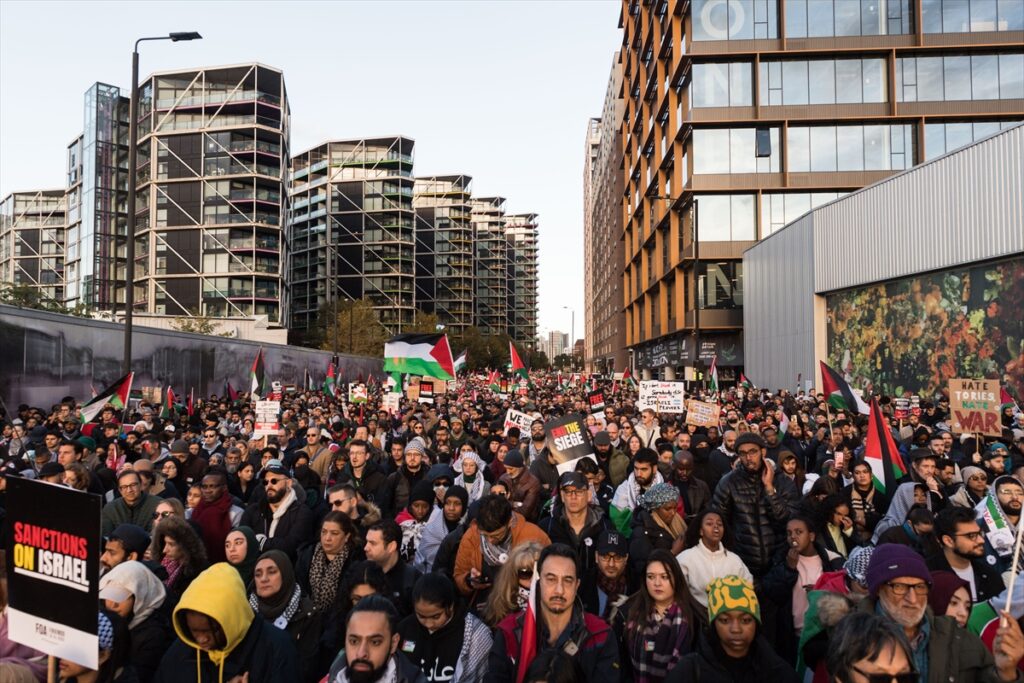
People in the British capital held a massive rally in solidarity with Palestinians and marched towards the US Embassy to press Washington for an immediate cease-fire in the Middle Eastern country.
A huge crowd gathered in London’s Hyde Park on Saturday to call for a cease-fire while protesting Israel and those governments that have yet to call for a cease-fire in Gaza, where the death toll has climbed to over 11,000 people.
Carrying Palestinian flags and signs, thousands of people after gathering at Hyde Park marched towards the US Embassy while chanting pro-Palestine slogans.
Meanwhile, a large number of British Jews from different groups gathered near the Bolivar Statue to protest Israel, joining thousands of other protesters calling for an end to bloodshed in the besieged enclave.
Palestinian Ambassador to the UK, Husam Zomlot, Former Labour Party leader Jeremy Corbyn, Labour MP John McDonnell as well as representatives of leading NGOs and unions also attended to the National March for Palestine.
The massive march came following days of controversy, as the pro-Palestine march coincided with Armistice Day in which the two-minute silence was observed on Whitehall.
– Far-right groups clash with police
Far-right groups, which earlier announced they would arrive Saturday in London to “protect the Cenotaph war memorial,” clashed with police.
English Defence League (EDL) founder Tommy Robinson was seen leading supporters through central London.
Gathering near Parliament Square, the group threw projectiles and insulted officers.
They also attacked an onlooker with a Palestinian flag. Some later tried to burn a Palestinian flag, while others tore down pro-Palestinian signs.
Hundreds of officers took measure to protect protesters who were returning the pro-Palestinian protest while far-right groups insulted Islam and Muslims, accusing the protesters of being “Hamas supporters,” and “terrorists.”
Metropolitan Police said 126 were arrested and nine officers were injured.
“Many in these groups were stopped and searched and weapons including a knife, a baton and knuckleduster were found as well as class A drugs,” said police.
It added that officers intercepted a group of 150 pro-Palestinian protesters who were wearing face coverings and firing fireworks. Arrests were made after some of the fireworks struck officers in the face.
Later, a clash took place at Trafalgar Square between pro-Palestinian protesters and a group of far-right demonstrators.
– ‘Wholly unacceptable scenes’
The British prime minister released a statement condemning the violence at the protests.
“I condemn the violent, wholly unacceptable scenes we have seen today from the EDL and associated groups and Hamas sympathisers attending the National March for Palestine,” said Rishi Sunak.
Referring to attacks by police on far-right groups, Sunak noted that what is happening does not defend the “honour of our Armed Forces, but utterly disrespects them.”
“All criminality must be met with the full and swift force of the law,” he said, adding he would have a meeting with the head of Metropolitan Police, Mark Rowley, in the coming days.
Earlier, Sunak called Saturday’s pro-Palestinian demonstration “disrespectful,” with an Armistice Day service scheduled on the same day.
Sunak noted that he would hold the Metropolitan Police chief accountable for allowing the demonstration on Armistice Day.
– ‘Home secretary must resign’
Meanwhile, Scotland’s First Minister Humza Yousaf accused Home Secretary Suella Braverman for the violence amid the Armistice Day ceremony.
“The far-right has been emboldened by the Home Secretary. She has spent her week fanning the flames of division,” he said.
“The Home Secretary’s position is untenable,” he wrote on X. “She must resign.”
Braverman has sparked widespread outrage after calling the protests “hate marches.”
Later she wrote an article in the Times, asserting: “I do not believe that these marches are merely a cry for help for Gaza.”
“They are an assertion of primacy by certain groups — particularly Islamists — of the kind we are more used to seeing in Northern Ireland,” she wrote.
